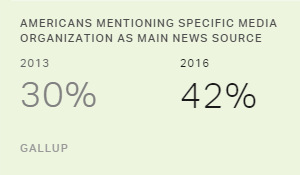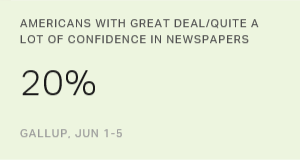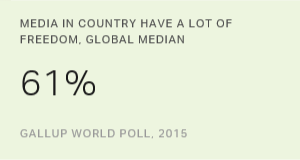Story Highlights
- 32% say they have "a great deal" or "a fair amount" of trust
- 14% of Republicans express trust, down from 32% last year
- Confidence drops among younger and older Americans
WASHINGTON, D.C. -- Americans' trust and confidence in the mass media "to report the news fully, accurately and fairly" has dropped to its lowest level in ║┌┴¤═° polling history, with 32% saying they have a great deal or fair amount of trust in the media. This is down eight percentage points from last year.

║┌┴¤═° began asking this question in 1972, and on a yearly basis since 1997. Over the history of the entire trend, Americans' trust and confidence hit its highest point in 1976, at 72%, in the wake of widely lauded examples of investigative journalism regarding Vietnam and the Watergate scandal. After staying in the low to mid-50s through the late 1990s and into the early years of the new century, Americans' trust in the media has fallen slowly and steadily. It has consistently been below a majority level since 2007.
Republicans Fuel Drop in Media Trust
While it is clear Americans' trust in the media has been eroding over time, the election campaign may be the reason that it has fallen so sharply this year. With many Republican leaders and conservative pundits saying Hillary Clinton has received overly positive media attention, while Donald Trump has been receiving unfair or negative attention, this may be the prime reason their relatively low trust in the media has evaporated even more. It is also possible that Republicans think less of the media as a result of Trump's sharp criticisms of the press. Republicans who say they have trust in the media has plummeted to 14% from 32% a year ago. This is easily the lowest confidence among Republicans in 20 years.

Democrats' and independents' trust in the media has declined only marginally, with 51% of Democrats (compared with 55% last year) and 30% of independents (versus 33% last year) expressing trust. Over the past 20 years, Democrats have generally expressed more trust than Republicans in the media, although in 2000, the two parties were most closely aligned, with 53% of Democrats and 47% of Republicans professing trust.
Trust in Mass Media Falls Across Age Groups
Older Americans are more likely than younger Americans to say they trust the media, but trust has declined among both age groups this year. Currently, 26% of those aged 18 to 49 (down from 36% last year) and 38% of those aged 50 and older (down from 45%) say they have a great deal or fair amount of trust in the media.
 ÔÇő
ÔÇő
In 2001, younger Americans (55%) were more likely than older Americans (50%) to express trust and confidence in mass media. This gap emerged again in 2005 when 53% of 18- to 49-year-olds had trust and 45% of those 50 and older expressed the same sentiment. Yet in the past decade, older Americans have mostly had more confidence than younger Americans, and this year, the gap between these age groups is 12 points. And 2016 marks the first time that confidence among older Americans has dropped below 40% in polling since 2001.
Bottom Line
The divisive presidential election this year may be corroding Americans' trust and confidence in the media, particularly among Republicans who may believe the "mainstream media" are too hyperfocused on every controversial statement or policy proposal from Trump while devoting far less attention to controversies surrounding the Clinton campaign. However, the slide in media trust has been happening for the past decade. Before 2004, it was common for a majority of Americans to profess at least some trust in the mass media, but since then, less than half of Americans feel that way. Now, only about a third of the U.S. has any trust in the Fourth Estate, a stunning development for an institution designed to inform the public.
With the explosion of the mass media in recent years, especially the prevalence of blogs, vlogs and social media, perhaps Americans decry lower standards for journalism. When opinion-driven writing becomes something like the norm, Americans may be wary of placing trust on the work of media institutions that have less rigorous reporting criteria than in the past. On the other hand, as blogs and social media "mature," they may improve in the American public's eyes. This could, in turn, elevate Americans' trust and confidence in the mass media as a whole.
Historical data are available in .
Survey Methods
Results for this ║┌┴¤═° poll are based on telephone interviews conducted Sept. 7-11, 2016, with a random sample of 1,020 adults, aged 18 and older, living in all 50 U.S. states and the District of Columbia. For results based on the total sample of national adults, the margin of sampling error is ±4 percentage points at the 95% confidence level. All reported margins of sampling error include computed design effects for weighting.
Each sample of national adults includes a minimum quota of 60% cellphone respondents and 40% landline respondents, with additional minimum quotas by time zone within region. Landline and cellular telephone numbers are selected using random-digit-dial methods.
View complete question responses and trends (PDF download).
Learn more about how the works.



